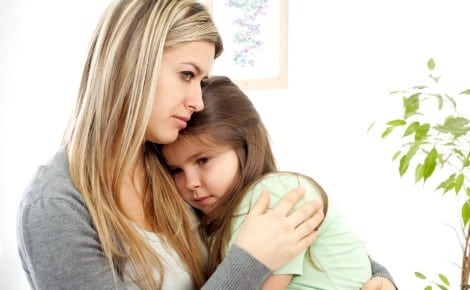
My child likes to talk about death. Wait, that’s not right. “Like” isn’t the correct word. She is interested in death — what happened, where they were when they died, where they are now, etc. It’s not surprising she has so many questions. In her short life, she’s had two relatives die. When she was just 18 months old, my father-in-law passed away from cancer. Ten months later, my brother died of a heart attack. While she wasn’t actually aware at the time of either death, she knows how important these people were to her father and I. She watched us grieve. Even as she saw us cry it would have been easy to shove away the pain and the memories and not talk about them or their deaths. But we didn’t, and we won’t.
Nobody really likes to talk about death and dying, right? It’s a sensitive subject. Either you’ve experienced a loss and talking about it is too painful, or you’re the one trying to comfort, in which case you oftentimes have no idea what to say to help. (By the way, I’ve found that many people want to talk about the person they have just lost, so don’t be afraid to bring it up.) It’s tricky, so when you come across somebody who is genuinely interested in the matter and has so many questions, you can’t help but face them head on, especially when it’s your own child.
“Mommy, where did Uncle Jake die?” she asked me one day on the way home from school after passing a funeral home. “WHERE did he die?” I asked making sure I heard her correctly. “Yes, where?” “Omaha’s (what she calls my mom) house,” I said without hesitating. “Oh,” she replied without emotion. Should we be talking about this? I remember thinking to myself. I didn’t really have time to answer my own question, before she asked, “Where is he now?” We’ve always told her Uncle Jake was in heaven with Pop Pop (what she calls my husband’s father), so I knew she was really asking where his body was. Again I answered honestly. ”He’s with Uncle Josh.” Please don’t ask how! “Oh,” she said. The questions kept coming, eventually moving on to her grandfather. I was delicate in answering, but also honest. Because why not?
 When my father-in-law passed away, it was very important to my husband that our daughter know who he was. She was so young that we knew she wouldn’t really remember him, but she could still know his sense of humor, his strong faith and his love for his family. When my brother died, I wanted her to know how much he loved her, how funny he was and his kind heart. This all meant talking about them on a regular basis. “Uncle Jake would have thought that was so funny,” I find myself saying at silly commercials and TV shows. “Pop Pop was so witty,” my husband said and still says with a grin every time he tells a dad joke. In teaching her about who they were, we have found that she also wants to know about how, when, where and why they died. Talking about it not only helps her better understand death, but it shows that there comes peace and healing.
When my father-in-law passed away, it was very important to my husband that our daughter know who he was. She was so young that we knew she wouldn’t really remember him, but she could still know his sense of humor, his strong faith and his love for his family. When my brother died, I wanted her to know how much he loved her, how funny he was and his kind heart. This all meant talking about them on a regular basis. “Uncle Jake would have thought that was so funny,” I find myself saying at silly commercials and TV shows. “Pop Pop was so witty,” my husband said and still says with a grin every time he tells a dad joke. In teaching her about who they were, we have found that she also wants to know about how, when, where and why they died. Talking about it not only helps her better understand death, but it shows that there comes peace and healing.
The interesting thing about her asking about death is that she doesn’t seem afraid of it. Children have a way of being fearless when it comes to the topic. They seem to know it will happen, and it will all be ok when it does. That angels will be made. That they’re never really gone. And what’s to fear in that? Children are actually a great source of encouragement during the grieving process. So, we have decided to share information as plainly and directly as they view it. Not through a sugar-coated answer that we adults may need more than them. And despite talking about our relative’s passing, our daughters are intentionally shielded from the bad men and women we see on the news. We are not trying to speak candidly and expose our children to hateful acts that they can’t comprehend.
But, the scary part isn’t the death. It isn’t the loving uncle or funny grandfather that’s no longer with us. We will see Jake and Pop Pop again. Our children understand this and by being open and honest with them about death, maybe we can, too.
Have you ever discussed death with your child?
If you’re looking for more ways to help your child cope with loss, check out these great posts on love and loss and activities for children dealing with grief.
















